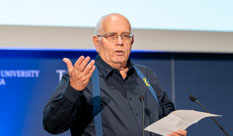More:
News & Stories
“Light Up Your Minds”
New EU Ideation Grant addresses challenges of 4th industrial revolution.

It’s a foregone conclusion that higher education institutions can no longer remain cloistered in their ivory tower if they are to remain relevant, functional, and accessible in the 21st century. Meeting the challenges of the 4th industrial revolution – Industry 4.0 – is integral to the success of modern universities in increasing their entrepreneurial and innovative capabilities, and paramount to their social and economic sustainability.
In a 5-partner grant of 1.2M Euro provided by the European Institute of Innovation and Technology (EIT) and shared by 5 institutions in Poland, Spain, Germany, Italy and Israel, HIT’s researchers from the Faculty of Industrial Engineering and Technology Management are playing a key role in creating a model which is based on 6 key action steps.
These steps include digital access for infrastructure sharing among HEI’s and different entities, harnessing the knowledge triangle network, crowd innovation and testing of crowdfunding opportunities to expand financing models, pre-incubation program, and international open innovation mentoring and training.
The activities are aimed at open innovation, shared economy, and social product development, in order to reflect the major shift in the way people work, create and study, particularly following the COVID-19 pandemic.
The HIT team, including Profs. Michael Winokaur and Arriel Benis, and Dr. Sofia Amador Nelke, are specifically focusing on the application of innovative remote learning models and new research methodologies in robotics and IOT labs. Their goal: to use digital resources to make existing infrastructure (equipment and devices, rooms and spaces, laboratories, software) accessible and thereby enhance their utilization.
At the core of the EIT grant is advancing the concept of Open Science for the benefit of institutions of higher education – faculty and students, industry, external partners, and ultimately the public-at-large. Disruptive trends like the rise of data and connectivity, analytics, human-machine interaction, improvements in robotics, as well as the social media-based reality in which we live, require a transformative way of operating.
The end result of the grant: ready-to-implement methodology which will allow for easy dissemination and replication in other entities and institutions of higher education, creating a ripple effect that will impact on a broad scale.
- News & Events
New Collaboration with Sheba Medical Center will qualify nurses to work in a digital environment.
Collaboration between HIT Holon Institute of Technology, the teaching authority of the Sheba Medical Center, and the Sheba-BEYOND virtual hospital will allow training nurses in Israel and around the world to work in a digital...



 Additional programs
Additional programs
